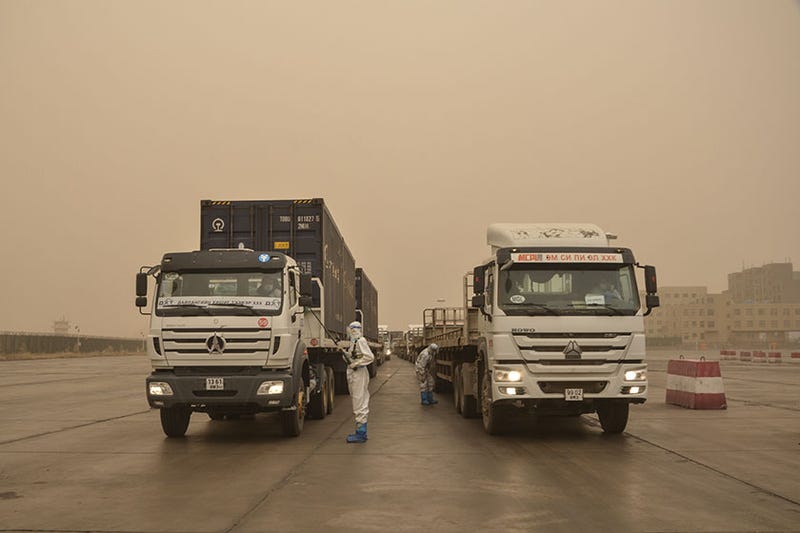CX Daily: How Kazakhstan Distances Itself From Russia to Pursue Domestic Reforms
Shanghai pledges to tighten oversight of pandemic supplies after complaints of rotten food.
TOP STORY
Kazakhstan President Kassym-Jomart Tokayev (left) and Russian President Vladimir Putin give a press conference after meeting at the Kremlin on Feb. 10. Photo: VCG
Kazakhstan /
In Depth: How Kazakhstan distances itself from Russia to pursue domestic reforms
Since Russia’s war on Ukraine broke out Feb. 24, Kazakhstan’s position toward the warring nations has shifted as Central Asia’s most populous country takes stock of the potential impact of sanctions on its economy, and balances its longstanding links with Russia with an ambitious reform agenda developed in the aftermath of civil unrest in January.
Kazakhstan initially responded to the war with an ambiguous stance, but in April, it released a series of measures in an attempt to distance itself from Russia amid international pressure as well as reports on the Bucha incident and other serious cases of Ukrainian civilian casualties.
In a rare article for U.S.-based The National Interest on April 4, President Kassym-Jomart Tokayev said turbulence in Eurasia “will not slow Kazakhstan’s progress.”
Developing the underdeveloped private pension system has been a policy priority in China in the past few years. Photo: VCG
Pension /
Five things to know about China’s private pension system
The State Council, China’s cabinet, released a policy document Thursday on developing the country’s private pension system, outlining a framework and paving the way for nationwide implementation.
“This is China’s first top-level design document for its personal pension system,” said professor Dong Dengxin at Wuhan University of Science and Technology, who specializes in pensions.
Developing the underdeveloped private pension system has been a policy priority in the past few years as the existing state-dominated system could soon run short of funds.
Covid-19 /
Shanghai pledges stricter oversight of pandemic supplies after complaints of rotten food
Shanghai’s market watchdog pledged to tighten oversight of pandemic supplies after residents complained that rotten food was being distributed by the authorities.
Residents are struggling to secure daily necessities as they remain stuck in their homes while the city battles its worst Covid-19 outbreak in two years.
Virus-free Tibet builds two makeshift Covid-19 hospitals
Quick hits /
China’s ‘zero-Covid’ strategy will drag growth to below 4%, Nomura says
Opinion: The doomsday scenario of U.S.-China financial decoupling
CATL’s market cap exceeded 1 trillion yuan in May 2021 and surged as high as 1.6 trillion yuan in December.
Batteries /
CATL sell-off wipes out billions of dollars of market value
Skyrocketing material costs shook the stock of Contemporary Amperex Technology Co. Ltd. (CATL) as investors wiped billions of dollars off the value of the world's largest electric-vehicle battery manufacturer.
Shenzhen-traded CATL’s stock tumbled 7.55% Wednesday to close at 407 yuan ($63.60) apiece, erasing 77.4 billion yuan of the company’s valuation in a single day. CATL’s market value stood at 948.7 billion yuan after the Wednesday close, the first time in nearly a year it was less than 1 trillion yuan.
Dragged down by the CATL rout, the Shenzhen Composite Index touched its lowest level since June 2020.
Huawei /
Huawei targets corporate clients as consumer business suffers
Huawei Technologies Co. Ltd. is reorganizing one of its business units to focus on government and enterprise clients after the tech giant reported sluggish sales of consumer-facing products like smartphones last year amid sanctions by the U.S.
At a product launch Wednesday, Richard Yu Chengdong, consumer and auto division head of Huawei, said Huawei renamed its “consumer business” to “terminal business” as the Shenzhen-based company sought to reap more orders from government and corporate customers for products like computers and printers.
Coal /
China to add 300 million tons of coal capacity this year
Top Chinese policymakers reiterated the importance of coal for the country’s energy security and laid out a plan to add 300 million tons of coal production capacity this year.
The State Council, China’s cabinet, pledged Wednesday to support coal production and projects to ensure the country’s energy supplies in a meeting chaired by Premier Li Keqiang. The expansion would represent about 7% of China’s projected coal consumption for this year.
Quick hits /
MU5735 crash report sheds little light on March disaster
Chinese oil giant CNOOC jumps 44% in first mainland trading









